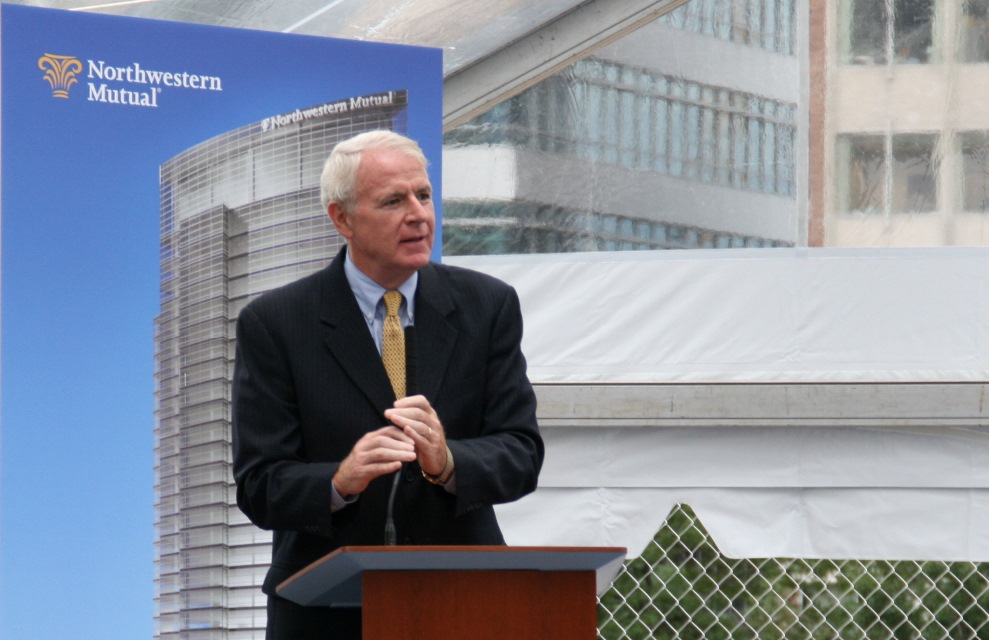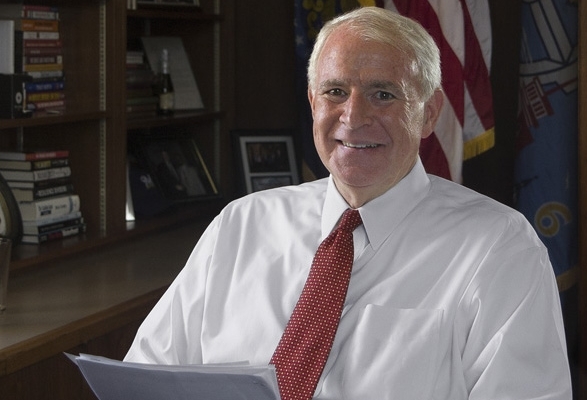Mayor Barrett’s 2018 Executive Budget Address
As Prepared for Delivery
The City of Milwaukee is strong. You know it and I know it. In every one of your districts and all around the city, good things are happening. Families are building a future, and yes, the people in our neighborhoods have faith in the City of Milwaukee.
Milwaukee’s strength is a result of our tradition of responsible and thoughtful City budgeting. You, as members of the Common Council, share the credit for funding our obligations, addressing changing needs, and maintaining a long tradition of government responsibility and frugality.
For 13 years we have cut, squeezed and reconfigured operations to maintain our shared priorities. We will continue to do that. However, this year, we are faced with difficult options, particularly when it comes to public safety.
Our men and women in uniform have earned our respect. They have earned our admiration. That makes these decisions so much more difficult.
In my time as Mayor, no City budget has presented more challenges or more frustration than this one. As challenging as this budget is, what I present to you today does not include any layoffs among the position reductions.
Yes, we have managed our fiscal matters extremely well.
The budget I am presenting today is not the budget I was hoping to introduce. The budget I was hoping to introduce would increase police funding. The budget I was hoping to introduce would maintain fire service. The budget I was hoping to introduce would invest in community prosecutors.
But there’s a big difference between hope and reality.
The reality is that we have to tackle increased employer pension obligations, increased costs to continue service delivery and constrained revenue options.
Under our current structure, our city, unlike every other major American city our size, is severely limited in our revenue options. The Public Policy Forum, the widely respected independent research organization, has said: “the City’s ability to address the needs of the Milwaukee Police Department and its aging infrastructure without negatively impacting service levels in other departments is growing short.”
In its report released earlier this summer, the Forum provided an excellent analysis of the constraints we operate under as we try and address the challenges. We are an outlier when it comes to revenue sources. As you know, State law limits us to two primary sources of revenue: State Shared Revenue and property taxes.
Ironically, at a time when our tax base is growing and we are adding to the state coffers, Shared Revenue, an essential part of our budget, is no longer funded fairly.
It is clear to anyone who is watching that local government financing is not a priority in Madison and the decreased, frozen Shared Revenue formula is costing us tens of millions of dollars.
Based on what you read and see, you might think it’s because the State does not have the revenue to share. That’s not true—the State has experienced a 59% increase in general purpose revenue in the last 14 years.
In fact the tables have turned to such an extent, that the amount of state revenue generated in Milwaukee now far exceeds the amount of state aid provided to us. Our economic strength is generating a Milwaukee dividend to the State.
In other words, the beneficiary of our economic growth is the State’s coffers. That’s because all Milwaukee businesses deliver sales and income tax to the State Treasury.
I’ve gone to Madison. I’ve strenuously argued Milwaukee’s case. I’ve made the argument that the State and the City can both thrive when Milwaukee is treated fairly.
Compounding our situation are fiscal challenges that need our immediate attention.
Amazingly, my 2018 budget for the Milwaukee Police Department surpasses the entire municipal tax levy for the third year in a row. The 2018 police budget totals $293.4 million and the tax levy is $273.5 million.
In addition, my 2018 budget includes an employer pension payment of $83 million. That’s $22 million more than we have been paying in recent years.
Why do we have to pay more? Over 90% of the additional expenditure is attributable to payments made on behalf of sworn public safety employees. They earn pension benefits faster and they retire earlier. That means that roughly $20 million more is going to police and fire but is coming in the form of pension payments and not direct services. That’s a huge problem.
I take the responsibility of maintaining the strength of our pension system very seriously. Just look at what has happened to so many pension systems around the Country that have underfunded their obligations. No responsible person wants Milwaukee to be in that situation. Our pension system is close to fully funded. And, maintaining that requires continued significant pension contributions.
Inevitably, critics will say ‘make cuts in other places.’ I want you to know, during my time as Mayor, we’ve reduced the number of workers in the general city workforce by nearly 300 positions. We’ve saved tens of millions of dollars in health care costs and dramatically reduced worker injuries and responsibly managed our borrowing costs.
In this year’s budget, we have reduced our capital borrowing by $12.7 million to better stabilize future debt payments.
Up until this point, every department has been asked to make sacrifices. And, this year we are asking even more.
We must have a more diversified revenue pool, and that’s why I have asked the Governor and the Legislature to let the people of Milwaukee decide if they, the residents, want a half-cent sales tax for public safety and crime prevention.
Let me be clear: I am not asking the State for more money. I am not asking the State to raise the sales tax. I am asking to let the people of Milwaukee decide if they want that investment in public safety.
I stand by our commitment to reduce crime and violence. My budgets, on a per capita basis, have always far surpassed other cities in the state on public safety expenditure and they will continue to do so.
Without a public safety sales tax, 33 of the 1888 police officer positions will not be filled. With a public safety sales tax, we will fund 1900 police officers and maintain that strength.
Without a local sales tax, three Fire Department apparatus will be eliminated and two will be browned out. Should a sales tax be approved in time, two of these apparatus would be put back into full service.
Faced with these alternatives, I am confident Milwaukeeans would choose to support a public safety sales tax.
My 2018 proposed budget includes a general fund budget increase of $8.3 million. Property taxes will increase $9.7 million or 3.7%.
What does that mean to the average property tax bill? We project an increase of just over $37. Combined with municipal fees, the total costs to the average residential property owner will up by about $48 or about 3.1%. Tempering that impact, we anticipate Milwaukee Public Schools will be lowering its tax rate.
My budget includes a major investment in the Health Department’s Office of Violence Prevention. Violence prevention cannot sit solely with the police and courts. We must balance our approach. That is why over the past year, I have added to the staffing of the Office.
Ceasefire Milwaukee will train community violence interrupters and outreach workers to prevent shootings driven by arguments and retaliatory violence—two of the leading causes of homicides and non-fatal shootings in the city. This approach involves targeted efforts to identify and mediate potentially lethal conflicts in priority neighborhoods throughout the city. The Ceasefire model focuses on individuals at highest risk of shooting or being shot through intensive case management and life changing interventions.
Bringing the right people to the table has helped the Milwaukee Public Library evolve from buildings with books into outstanding education and information institutions in our neighborhoods. Early next month, we will celebrate the opening of the new Mitchell Street Library, an innovative mixed-use development that features a maker space where our residents can improve their skills and talents.
The next libraries up for replacement are Capitol and Martin Luther King. My budget includes $4 million to continue the progress we have made replacing and upgrading these neighborhood assets.
I’m also very pleased library hours are maintained at 2017 levels.
When I served in Congress, I began my efforts to deliver funding to address lead hazards that threaten children and families. As Mayor, I have brought and invested more than $50 million to Milwaukee to combat lead hazards. And, the results are remarkable, recording a nearly 70% decline in children with elevated blood lead levels. But, let me be clear: We have much more work to do. Too many children in our community face lead hazards where they live and play.
That is why I am continuing my investment into the Health Department’s Childhood Lead Poisoning Prevention Program. In 2018, I have added $487,000 to the Department’s $2.5 in grant funding to continue its front-line work. That is nearly $3 million to support the work to prevent lead exposure before it occurs and respond comprehensively to cases where a child has been exposed.
We all agree that reducing lead is a high priority for Milwaukee’s public health. The Milwaukee Water Works has aggressively implemented a new program to replace full lead service lines in 2017. The department is on track to replace over 600 lead service lines in 2017. We have completed 383 as of today and the rest are under contract. In 2018, we will scale the program up to replace 800 lead services lines, with plans to continue increasing our target in future years. I am proposing a total Water Works funding package of about $8.8 million for these programs in 2018.
Nearly a decade after the national housing crisis devastated some Milwaukee neighborhoods, we continue to wrestle with the aftermath. My Strong Neighborhoods Plan is focused on housing strength and stability. We are returning foreclosed properties to productive use, adding to the City’s tax base and assisting neighbors in building stronger blocks.
We are investing in streets, water mains and making sure we are not leaving important infrastructure work to future budgets.
There are pressing needs, significant demands, evolving challenges, and limited resources. The only option before us is to budget responsibly.
We must resist the temptation for short-term fixes that will lead to long-term problems. Increasing reserve use or borrowing or pushing expenses into 2019 will only lead to much larger budget challenges that could become impossible to fix.
I will continue to ask the Governor and the state legislature to permit us to diversify our revenue sources. I am not giving up that fight. The limitations placed on the City of Milwaukee are demonstrably unfair. I am insisting that Milwaukee is equipped with what it needs to meet the needs of a first class city.
And we are a first-class city – first-class when it comes to commerce, quality of life, creativity, and natural assets. Our residents are first-class people, hardworking, dedicated, generous, and solid citizens.
We have a budget here that prioritizes and allocates the funds we have available. It is a balanced plan that requires strategic use of available reserves and the appropriate use of borrowing. As you review the recommendations before you, I ask that you keep in mind Milwaukee’s strengths. We owe it to our residents to defend and build on the assets that make Milwaukee a strong city. That is important for 2018 and for the long-term future of our city.
NOTE: This press release was submitted to Urban Milwaukee and was not written by an Urban Milwaukee writer. While it is believed to be reliable, Urban Milwaukee does not guarantee its accuracy or completeness.
























Do members of the Common Council really need to make $70K+ a year? That’s far more than public safety employees (fire and police) make. I’d argue that public safety employees’ work is a lot more hazardous and strenuous and does the average Milwaukee resident a lot more good than the avreage alderperson who sits around in meetings all day.
“That’s far more than public safety employees (fire and police) make.”
Teachers too. Let’s not forget them.